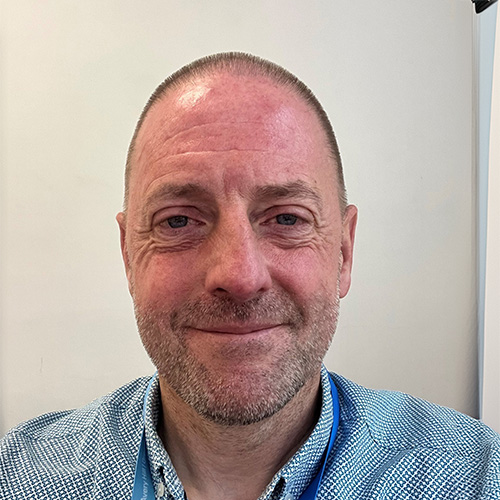Key details
John Foster
Associate Professor in Forensic Science
John Foster was employed in Forensic Services with the Metropolitan Police for nearly 36 years, with 24 years of that time dedicated to dealing with top-tier crimes in Homicide and Unexpected Death Investigation. As an Operational Forensic Consultant, he coordinated the forensic response to Homicide and Death Investigations and served as the technical lead for Frontline Forensic Services and has been delivering Detective and Practitioner Training for over 15 years and holds an Award in Education and Training at Level 3.
Starting as an Identification Officer in 1988/89, he received dual training and qualification in Scenes of Crime and Fingerprint Expertise. Throughout his career, John has worked in Counter Terrorism, Specialist Crime, and various other Commands. In 1999/2000, he was part of the Flying Squad Team, providing a holistic approach to forensics from crime scene to court and during this time, led the forensic team for the De Beers Diamond robbery at the Millennium Dome, coordinating the forensic response.
In 2000, John joined the Homicide Forensic Command and was trained and qualified as both a Crime Scene Manager and Crime Scene Coordinator, roles in which he spent 24 years of their career. In 2005, he was part of the body recovery and identification team that went to Thailand to support the Disaster Victim Identification for the Tsunami disaster, for which he received a Commissioner’s Commendation.
John has also been involved in several high-profile cases both nationally and internationally, including reviewing the deaths of two backpackers in Thailand and reporting to the family on behalf of the Foreign and Commonwealth Office, earning another commendation from the Commissioner for Norfolk Constabulary. He was requested to go to Pakistan to assist in setting up their Forensic Services Laboratory, sharing best practices, and developing and delivering a training package for their Forensic Management process.
John is an associate of the Chartered Society of Forensic Science (awaiting membership approval), a Co-Chair of the National CSI Technical Forum for Major Crime Accreditation, Training, and Competency, and a member of the Forensic Capability Network ‘Niche’ Working Group shaping the future of specialist forensic services. Additionally, he is a member of the Pathology Delivery Board, holds the Metropolitan Police Lead for Forensic Pathology, serves as the Forensic Representative on the Homicide Improvement Board, and is a member of the ENFSI Scenes of Crime Working Group Committee.
Responsibilities within the university
Programme Leader
- Forensic Science (Extended)
- Forensic Science
- Forensic Science with Industrial Placement
- Forensic and Digital Investigation
- Forensic and Digital Investigation with Industrial Placement
- Forensic Science with Criminology (Extended)
- Forensic Science with Criminology
- Forensic Science with Criminology with Industrial Placement
- Forensic Science (Extended) (UGIC)
- Forensic Science with Criminology (Extended) (UGIC)
Module Leader
- Skills in Crime Scene Examination, Evidence Recovery and Law
Awards
- Award In Education and Training Level 3, 2023
- Director of Forensic Services Commendation for dedication and outstanding contribution to the delivery of Forensic Services in Serious and Violent Crime, 2022
- OCU Commander Commendation for dedication to Crime Academy Detective Training in Forensic Management, 2018
- Norfolk Constabulary Chief Constable Commendation for Diligence and Professionalism in reviewing the Murder of Hannah Witheridge and David Miller in Thailand, 2016
- Assistant Commissioners Commendation for Operation Yannah (National Human Tissue Audit), 2015
- OCU Commander Commendation for dedication to Crime Academy Senior Investigating Officer Training in Forensic Management, 2014
- OCU Commander Commendation for dedication to Crime Academy Detective Training in Forensic Management, 2013
- Commissioners Recognition of Long and Meritorious Service, 2010
- BSc Honours Degree in Policing – Canterbury Christ Church University, 2006
- ACPO Chief Constable Commendation for Dedication and Bravery in the Tsunami DVI Deployment, 2005
- Qualified Crime Scene Manager/Coordinator, MPS, 2000
- Qualified Fingerprint Expert Witness and Crime Scene Examiner, MPS, 1993
Recognition
- Associate of the Chartered Society of Forensic Science (awaiting membership approval)
- Co-Chair of the National CSI Technical Forum for Major Crime Accreditation, Training and Competency
- Member of the Forensic Capability Network ‘Niche’ Working Group shaping the future of specialist forensic services
- Member of the Pathology Delivery Board and hold the Metropolitan Police Lead for Forensic Pathology
- The Forensic Representative on the Homicide Improvement Board
- Member of the ENFSI Scenes of Crime Working Group Committee.
Research / Scholarly interests
- Direct Ammunition Recovery Technique– Live Pilot Project into the forensic recovery of spent casings to improve the opportunities for DNA analysis, 2020-21
- National Institute for Health Research project ‘Improving patient outcomes in the hot zone of major incidents’, 2021-24
- Home Office research study into Bladed Injury to Improve Police Officer Body Armour, 2021-22
- Leverhume Trust and South Wales University Research Insight into Homicide Investigation and Forensic Science, 2018-2020
- Comparison of Presumptive Blood Test Kits and Validation of Hexagon OBTI, 2005
